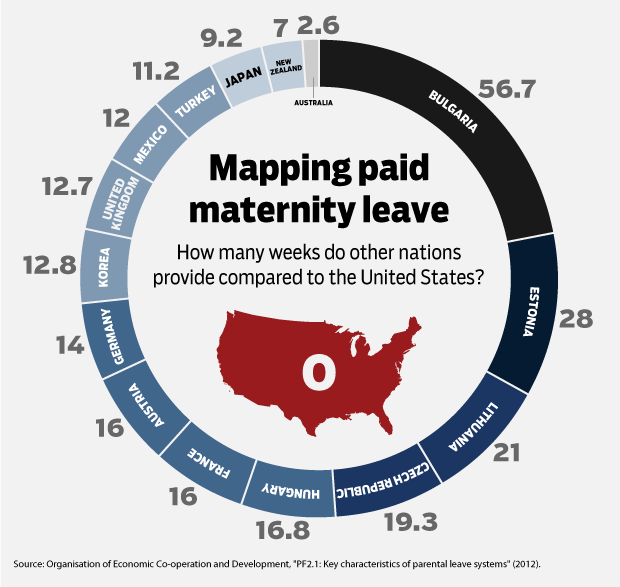Two decades ago our nation’s leaders took an important step toward bringing U.S. policies on family leave more closely in line with those of other developed nations. In signing the Family and Medical Leave Act into law, President Bill Clinton ensured that workers at companies with 50 or more employees in a 75-mile radius would be guaranteed 12 weeks of unpaid job-protected leave annually for events such as the birth of a child or to care for a sick loved one.
President Clinton spoke in favor of the bill on both moral and economic grounds, calling it “a matter of pure common sense and a matter of common decency.” He also emphasized that, “Over the long run, the lessons of the most productive companies in the world … are that those who put their people first are those who will triumph in the global economy.” It was the first piece of legislation President Clinton signed into law during his time in office.
Twenty years later, however, U.S. policymakers have done little more to make our workplaces and workforce more competitive, productive, and secure. Less than 60 percent of American workers are currently eligible for the protections outlined in the Family and Medical Leave Act, meaning that 54 million Americans are forced to choose between their jobs and their families’ well-being. And lawmakers have done nothing more to guarantee that new mothers can afford to take time to care for a child or that workers can remain financially secure while caring for a sick or dying parent.
The United States remains the only wealthy developed nation in the world not to guarantee any weeks of paid parental leave for new mothers and fathers, putting it in the company of nations such as Papua New Guinea and Swaziland. Moreover, paid maternity leave is a given across the developed world. And paid maternity leave isn’t just available in European nations that embody traditional social-democratic principles—no, it’s available for 12 weeks in Mexico, South Korea, and Turkey; for 21 weeks in Lithuania; and for 56 weeks in Bulgaria.

America is lagging dangerously behind. Women are increasingly the main or sole breadwinners in our families, and, among low-income Americans, women are the primary breadwinners in approximately two out of three families. When mothers are forced to choose between their paycheck and caring for a newborn, our entire nation suffers. The importance of maternity leave for a newborn’s health is backed by years of research, and the short-term benefits for the child and the mother translate into better long-term outcomes for both, including decreased health care costs. Businesses can also save money by reducing worker turnover through improved worker benefits.
Paid leave is an investment countless other nations have already made in their families, their economies, and their futures. While we should commend employers who choose to provide paid leave to their workers, it is our legislators’ responsibility to guarantee and protect all U.S. families with this very basic right.
President Clinton was correct in 1994 when he said the Family and Medical Leave Act would “strengthen our families … businesses, and our economy as well.” The 20th anniversary of the passage of the law should remind U.S. policymakers that helping families and helping businesses need not be mutually exclusive.
Jane Farrell is a Research Assistant for Economic Policy at the Center for American Progress.